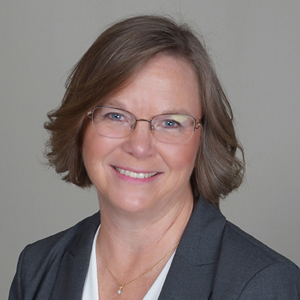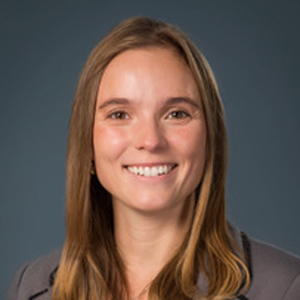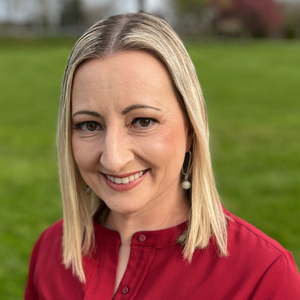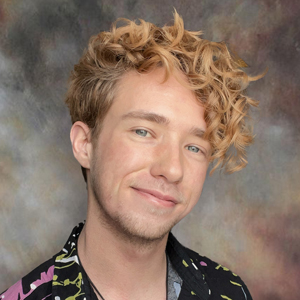
Article
November 28, 2022
Written by Deanna Herbert
Graduate School Showcasing Student Research at Fall Symposium
Graduate students from the University of Northern Colorado are putting their scholarly skills on display during the fall 2022 Graduate Research Symposium on Tuesday, Dec. 6. This year’s symposium is the first of its kind, combining the university's biannual Graduate Research Evening with its second annual Northern Colorado Three Minute Thesis (3MT®) competition.
Anne Boris, pictured center, was the winner of UNC’s spring 2022 3MT competition. Her dissertation project, “Stealth Dyslexia: Cognitive and Achievement Profiles of Gifted Students with Dyslexia,” was one of seven presentations delivered by UNC graduate students at the event last February.
Graduate students from the University of Northern Colorado (UNC) are putting their scholarly skills on display during the fall 2022 Graduate Research Symposium on Tuesday, Dec. 6, from 4-8:30 p.m., in UNC’s University Center and Campus Commons.
This year’s symposium is the first of its kind, combining the university’s biannual Graduate Research Evening with its second annual Northern Colorado Three Minute Thesis (3MT®) competition. The event kicks off with a keynote address from 4-5 p.m. from Maria Lahman, Ph.D., a professor in UNC’s College of Education and Behavioral Sciences Applied Statistics and Research Methods program. In her address, titled “Crafting a Lifetime of Becoming a Culturally Responsive Researcher,” Lahman will forward the tenets of culturally responsive research and the qualities of a culturally responsive researcher. Attendees will be challenged to choose a quality focus area for their current or upcoming research. Reflexivity and a commitment to always becoming a researcher will be detailed and advocated for as a way to maintain a renewing researcher life.
Throughout the evening, master’s, specialist and doctoral candidates from across the university will give oral and poster presentations on research topics ranging from collegiate recreation staff experiences with students with disabilities to comparing aquatic plant growth using different substrates. Five students will go a step further, putting their communication skills to the test in the NoCo 3MT, a competition designed to inform and engage as students will have three minutes and a single slide to explain their thesis or dissertation projects using non-technical language anyone can understand.
Students competing in Graduate Research Evening are eligible for the Hutchinson-Lahman Research Award, established to support graduate students’ dissemination of their research at national or regional conferences. The winner of the NoCo 3MT will receive a monetary prize and go on to compete in the Colorado Council of Graduate Schools 3MT competition next spring.
Learn more about the doctoral students taking part in this year’s NoCo 3MT and get a glimpse of what they’ve been working on. Video presentations from the spring 2022 competition are also available on the Graduate School’s website.

Melissa Gibson-Steiner
Program: Educational Leadership, Ed.D.
Title of Dissertation: Elementary Principals’ Perceptions of The Influence of the Covid Pandemic on Their Professional Identities
About my research: The purpose of this qualitative phenomenological study was to understand elementary school principals’ perceptions of the influence that the COVID pandemic had on their professional identities within the context of their school and community. I conducted semi-structured interviews with six elementary principals from Colorado. This study found that the participating principals relied on existing professional identities, recognized an increase in the ethic of care and shifted toward shared leadership.
What inspired me to pursue this research: I was raised by a small business owner who ensured his customers’ needs were met and developed a value for servicing others and working hard to meet their needs. However, during the COVID pandemic lockdown, I found myself in a situation where I was unable to serve others. My role as assistant principal disappeared as students no longer needed support. When we returned to school in the fall of 2020, we closed our doors and logged into virtual meetings. I found building and maintaining relationships to be complicated. Being an educational leader during the COVID pandemic was a challenging experience. Throughout the 2020-21 school year, I watched principals and district leaders lead endlessly to the point of exhaustion from stress and non-stop work. As I reflected on my experience and developed an understanding that one’s experiences may influence a person’s professional identity, I wondered if leading through the pandemic may have influenced how others identified as leaders.
How I envision my research being used: School leadership is complex, and principals will likely face uncertain times during their careers. The findings from this study may support new and existing leaders to understand that they may rely on existing professional identities as a foundation for their decision during uncertain times. Also, they may need different strategies and skills to move their schools forward when faced with unfamiliar situations. In doing so, it is beneficial to pause and reflect to see if their professional identities have shifted. In addition, leadership development programs can assist new leaders in understanding that their professional identities may change over time and the importance of establishing reflective practices.

Lea Haverbeck Simon, MA, ACSM-CEP, CCES
Program: Sport and Exercise Science — Exercise Physiology Concentration, Ph.D.
Title of Dissertation: Effect of Exercise Training on Circulating Cancer-Associated Immune Cells in Breast Cancer Patients
About My Research: My dissertation research focuses on the effects of exercise on immune cell count and function in the blood of breast cancer patients, as it is the primary cause of cancer death among females.
What inspired me to pursue this research: I always knew I wanted to use my exercise physiology knowledge for the clinical population rather than elite or performance athletes. Here at UNC, we are fortunate to have the excellent UNC Cancer Rehabilitation Institute that helps cancer patients and survivors to improve their quality of life by attenuating cancer and treatment side effects, as well as supporting their physiological and psychological well-being through exercise. Through my PhD coursework I was lucky to find out about the growing field of exercise onco-immunology. I believe that targeting the immune system will be the future to combat not only cancer but other chronic diseases, and exercise is a great immune-modulator that we may use to support an anticancer immune profile.
How I envision my research being used: I hope that evidence of the positive exercise effects on immune function in the context of cancer will further support the utilization of adjuvant exercise rehabilitation in addition to standard and novel promising cancer treatments, with the overarching goal to support health outcomes.

Donna Lynch
Program: Dance Education, Master of Arts
Title of Thesis: Dance Education in Pennsylvania Charter Schools: Advocating for Parity Among the Core Arts Disciplines
About My Research: My original goal was to inventory existing dance programs in Pennsylvania’s secondary schools. However, this specific idea was already being explored and researched by the Pennsylvania Dance Education Organization (PaDEO). PaDEO was collecting data in order to support their advocacy efforts for state certification for dance educators. After speaking with their leadership, I pivoted in a new direction that was still in line with exploring dance program availability in the state of Pennsylvania, while directly supporting PaDEO’s advocacy efforts. While PaDEO’s research focused on the 500 public school districts in Pennsylvania, my research focused on the 179 charter schools in the state. I conducted an online survey of charter school educators and administrators, including questions about all dance opportunities offered at the schools both for academic credit and extracurricular. The data suggested that although educators recognize valuable benefits of dance programming to student achievement, there are still only a small number of schools offering dance courses for academic credit. The data also revealed that school finances and budgets remain the largest influence on schools’ ability and willingness to offer dance alongside their other arts courses. In gathering this information and presenting an argument for parity among the arts disciplines, it is my goal to illustrate the importance of dance as a crucial component to a comprehensive arts education.
What inspired me to pursue this research: After unsuccessfully navigating the frustrating process of trying to become certified to teach dance in Pennsylvania K-12 schools, followed by an equally unsuccessful proposal to a local school board to implement dance, I was determined to become an advocate for dance education. In order to advocate for more dance programs to be included in Pennsylvania K-12 schools, I set out to discover what dance opportunities currently exist in those schools.
How I envision my research being used: I believe dance should be taught in all K-12 schools. According to the Pennsylvania Department of Education, “All students in grades K-12 must be provided with instruction in all four arts disciplines: dance, music, theater and the visual arts.” While support for the arts is present, there is an obvious disparity in the prevalence of each of the four core arts disciplines. My research indicates that by excluding dance from school course offerings, Pennsylvania schools are missing an opportunity to provide their students with the necessary tools for success as well as appropriate access to an art form that offers 21st century skills, such as communication, collaboration, creativity and critical thinking.

Karsen Gromm
Program: English, Master of Arts
Title of thesis: Not Thrones and Crowns but Men: Clowning and Community as a Modern Reformation in Godspell (1971) – tentative title
About My Research: I studied two works that had a major influence on Godspell (The Feast of Fools by theologian Harvey Cox and Towards a Poor Theatre by director Jerzy Grotowski) to understand how Godspell uniquely interprets the gospels and how it works as a piece of theater. I watched recordings and interviews, read scripts and reviews and looked at photos to get a good sense of how Godspell was originally created and performed in the 1970s. Using theories from Cox and Grotowski on the role of festivity in religion and collaboration in theater, I was able to make meaning out of the choice to have all of the characters be clowns and the choice to center the narrative around those clowns building community rather than recounting events surrounding the life of Jesus. Overall, I found that these choices were a response to a cultural moment that needed levity and connectedness, and they continue to make the gospels feel accessible and the goals presented in them attainable to a wider range of audiences.
What inspired me to pursue this research: I was introduced to Godspell 12 years ago and was instantly fascinated by it. Within a couple months, I’d memorized the movie shot for shot. Coming into the master’s program at UNC, I knew I wanted to work with some sort of interdisciplinary adaptation study and examine how non-linguistic elements influence the messages people take away from a text. After doing a term paper on Godspell and Jesus Christ Superstar, it was suggested that I narrow down to one show and continue that research for my thesis project. Since there’s very little academic research on the show, it was a great fit both in terms of the scholarly need for the research and my own personal passions.
How I envision my research being used: Because my research overlaps several fields of study, I imagine it could do many things. In religious studies, it may be used to understand varying and unique ways of modernizing and performing religious ritual and interpreting religious texts. It also touches on a lot of the issues we’re seeing with the decline of modern Christian churches, so my research may help contribute to understanding how we may revive and reform those communities and their traditions in response to our modern culture. In theater studies, it may be used as a tool to preserve the legacy of Godspell and establish its unique place in theater history. For both, it’s a case study in how to blend and borrow from multiple disciplines to enhance the final product.
Nyssa Thomassen
Program: Education M.A.T. – English Education Concentration
Title of Dissertation:Writing Workshops to Improve Social Equity Perception in Secondary Students
About My Research:I have a few students in a case study to show how their perceptions of writing for social equity change based on what they learn from writing workshops.
What inspired me to pursue this research: Students, teachers and administrators where I’ve been working see writing as important only as a way to improve test scores, which leads to apathy.
How I envision my research being used: I think my research is a springboard to larger studies, perhaps in the efficacy of writing workshops for secondary students, or for social equity and writing generally.



